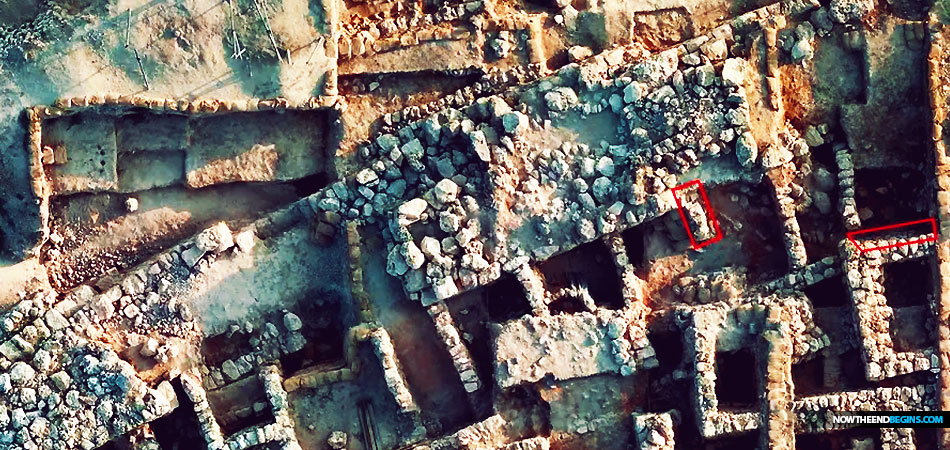
This passage in the Bible may have come to life just a few weeks ago for a team of 200 archaeologists and volunteers, who have been excavating in the field of ancient Shiloh.
One of the most fascinating things to me about the
work of biblical archaeologists is that they work for years to discover artifacts and objects mentioned in scripture without ever believing the scriptures which reference the objects they have found. Imagine being that close to Bible truth, holding it in your hand, and yet never putting it in your heart and believing it. It reminds me of
Alexander Scourby who so wonderfully recorded the entire
King James Bible with that amazing voice God gifted him with, and yet died an unsaved man. He had God's pure words in his mouth, and never swallowed them. Heartbreaking.
"For it is impossible for those who were once enlightened, and have tasted of the heavenly gift, and were made partakers of the Holy Ghost, And have tasted the good word of God, and the powers of the world to come, If they shall fall away, to renew them again unto repentance; seeing they crucify to themselves the Son of God afresh, and put him to an open shame." Hebrews 6:4-6 (KJV)
This latest find in Israel is still be sorted out and debated, but could absolutely wind up being the tabernacle where Joab fled and caught hold of the horns of the altar from 1 Kings 2. I believe by faith that everything in the Bible is true and trustworthy, and every event mentioned there happened exactly as scripture said it did. I do not need archaeological proof to believe it, but to have the archaeological proof? Well, to me, it's breathtaking and I rejoice everytime a new story like this comes out.
A most exciting find at the end of summer 2018 was a ceramic pomegranate
FROM THE JPOST: This summer, under the guidance of Dr. Scott Stripling, they made the discovery of a horn, which was one of the four corners of an ancient altar, as described in Kings. The find, said Stripling, director of excavations at ancient Shiloh and head of the Associates for Biblical Research, is consistent with what he expected to find in the fields of the ancient city where, according to the biblical account, the tabernacle for the Ark of the Covenant once stood.
"Then tidings came to Joab: for Joab had turned after Adonijah, though he turned not after Absalom. And Joab fled unto the tabernacle of the LORD, and caught hold on the horns of the altar." 1 Kings 2:28 (KJV)
Stripling is a biblical archaeologist. He has been excavating the land of Israel for decades. He directed excavations at
Khirbet el-Maqatir from 2013 to 2017, served as a field supervisor of the
Tall el-Hammam Excavation Project from 2005 to 2010, and was a supervisor of the Jerusalem Temple Mount Salvage Project, as well.
His Shiloh team is made up of archaeologists and volunteers from 11 universities around the world – an interdisciplinary team of scientists, historians and biblical scholars. In the last three years, they uncovered multiple large pithoi – “famous Israelite collar-rimmed jars” – inside a series of “storage rooms” that they found surround the ancient city.
These jars, more of which were found over the 2019 summer, likely held grains and fruits – tithes in Stripling’s words, brought by the Israelites to the Temple. The group also discovered a kobaat, a goblet or ritual chalice, which could be linked to religious use.
A most exciting find at the end of summer 2018, Stripling said, was a ceramic pomegranate.
“The pomegranate is a sacred motif,” he said. “The only sites in Israel where we have found pomegranates like this one have been Levitical sites.”
The pomegranate measures between 2.5 and three inches and has hooks by which it could be hung, he explained. Stripling said a similar pomegranate was found nearly 100 years earlier by another excavation team. He said the Bible describes pomegranates hanging from the bottom of the robe of the High Priest, who served in Shiloh for more than three centuries – after the conquest of Canaan and until King David established Jerusalem as the eternal capital of the Jewish nation.
"And beneath upon the hem of it thou shalt make pomegranates of blue, and of purple, and of scarlet, round about the hem thereof; and bells of gold between them round about: A golden bell and a pomegranate, a golden bell and a pomegranate, upon the hem of the robe round about. And it shall be upon Aaron to minister: and his sound shall be heard when he goeth in unto the holy place before the LORD, and when he cometh out, that he die not." Exodus 28:33-35 (KJV)
“Make pomegranates of blue, purple and scarlet yarn around the hem of the robe, with gold bells between them,” reads Exodus 23:33 in reference to the High Priest’s dress.
There are seven sacred foods in the land of Israel – two grains and five fruits, Stripling explained. But only one of them “goes into the presence of God, only one of them is sacred, and that is pomegranate… The pomegranate is a major motif of the Tabernacle and the Temples.
“The Bible and other ancient religious texts is what has driven archeology in this region,” Stripling said, proud to hold the holy book in one hand and a shovel in his other. “We have to recognize the validity of the Bible… I am comfortable with the biblical story – and now we have proof of that story, really.”
READ MORE
No comments:
Post a Comment